From a post about how to ace an interview with venture capitalists:
4. Practice the interview under extreme circumstances
A friend of mine whose wife recently got accepted into YC shared a hilarious but clever tip: practice under manufactured duress. He told me that he would literally throw socks at her, dance in the background, or yell at her while she was reviewing answers — anything to try and throw off her focus.
Last week I was talking to a friend who was about to go to Thailand for the first time, and I told her about our trip there with wee Oliver, many years ago.
That trip was, in a sense, an example of “practice under duress”: if we could fly halfway around the world with Oliver and make our way in utterly different cultural circumstances, we could do anything.
When we flew to Europe a year later it felt like crossing the street by comparison.
That trip to Thailand made all the trips that followed it possible.
Bringing a process that I started 18 months ago to a close, I deleted my @ruk Twitter and Instagram accounts entirely last night.
Although I’d stopped posting to either a long time ago, I was still dropping in from time to time to check in and see what was going on; this never proved to be anything more than dispiriting, and so pulling the plug wasn’t difficult.
I encountered the following fields on a government form required to set up electronic payments and I couldn’t figure out what each meant:

This seems to happen every time I am asked for this information; to avoid having to phone the credit union every time, I’m documenting this here.
- Branch Number (also known as Transit Number) – According to Wikipedia, “Each branch in a financial institution is assigned a unique transit number for identification. The final digit of the transit number indicates the geographical location of the branch.” At Provincial Credit Union, the number is 39073.
- Institution Number (also known as Bank Code, Financial Institution Number) – Each bank and credit union has one. Provincial Credit Union’s number is 839.
- Bank Account Number – what it seems, just my regular old bank account number.
Catherine’s piece Lists of Life is part of the exhibition Who’s Your Mother? Women Artists of P.E.I., 1964 to the Present that opened last night at the Confederation Centre of the Arts.
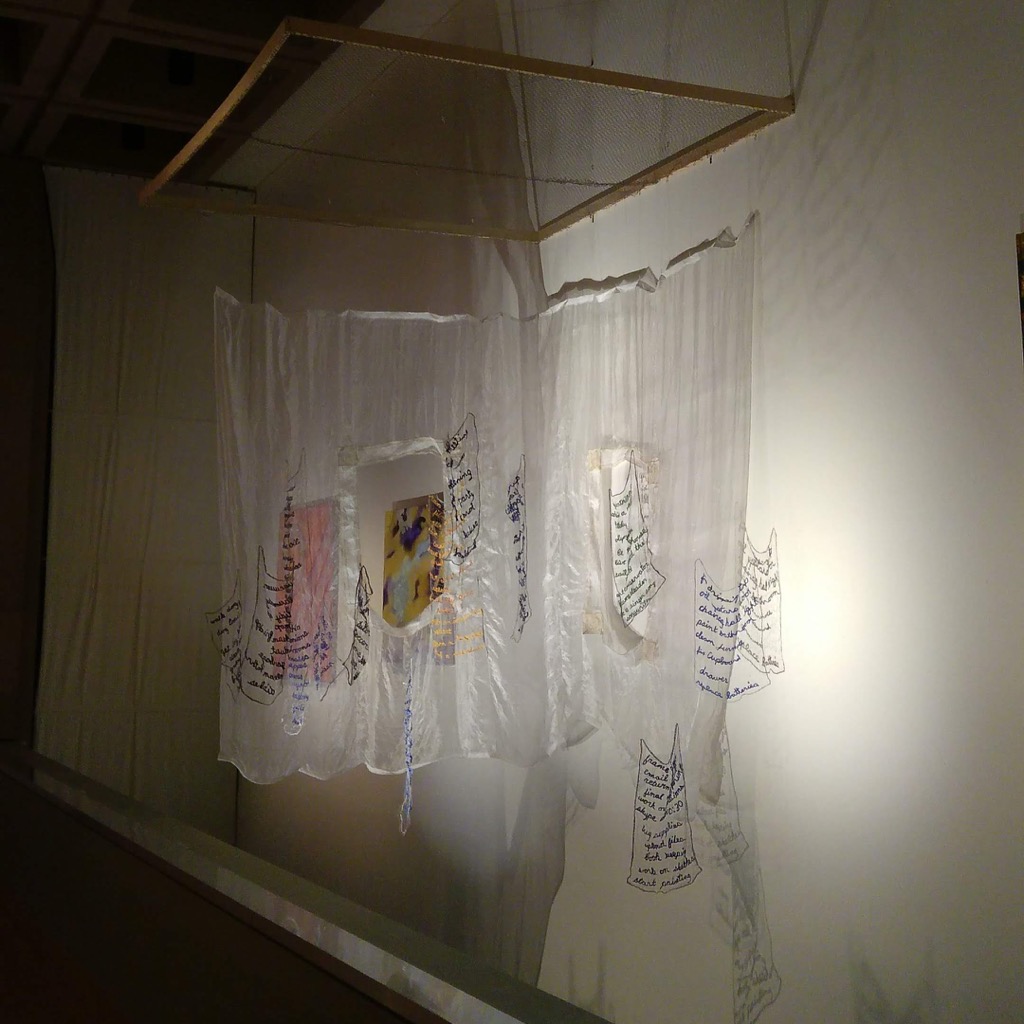
One of the unanticipated delights of the piece is that, because it’s suspended over the opening at the edge of the second floor gallery that looks down to the first floor, it dances in reaction to the air currents flowing through the building. No more so was this evident than when the formalities of the opening were happening immediately underneath it: the piece jiggled and swayed every time the audience applauded or the speakers spoke.
The other unanticipated aspect of the piece is how it casts shadows on the wall behind it:
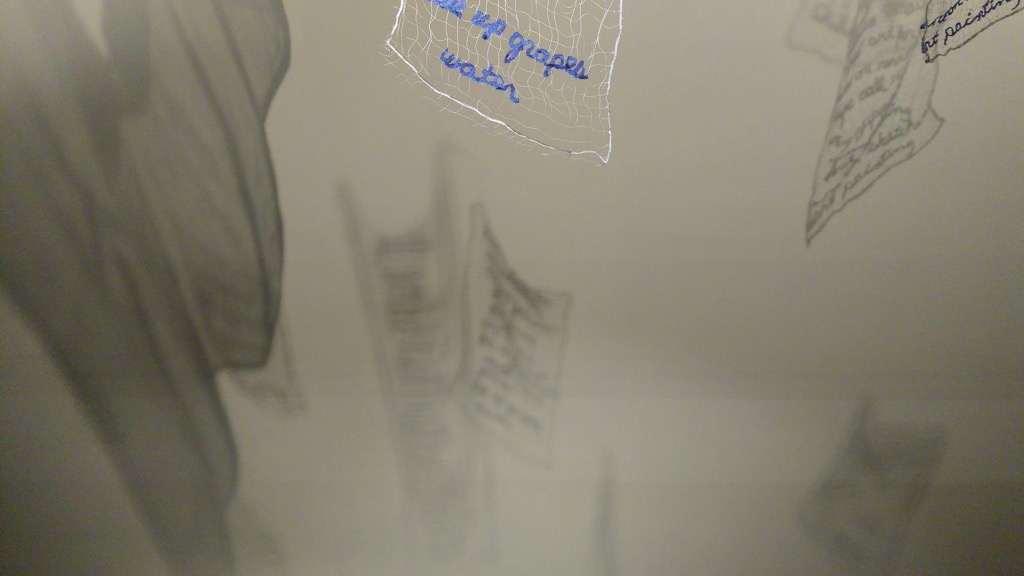
The piece consists of of a set of lists, stitched on netting, which are suspending inside a ethereal fabric room:
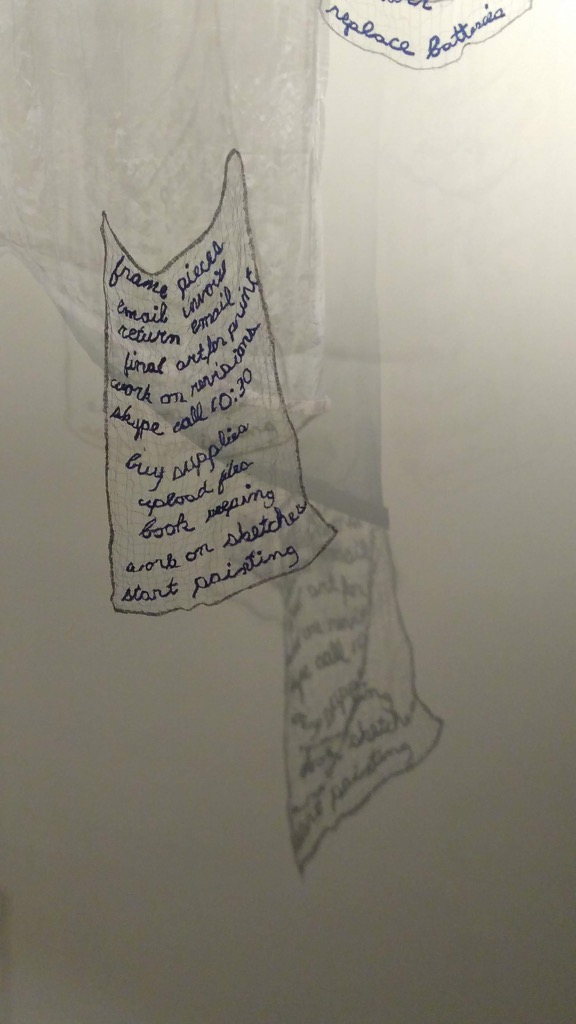
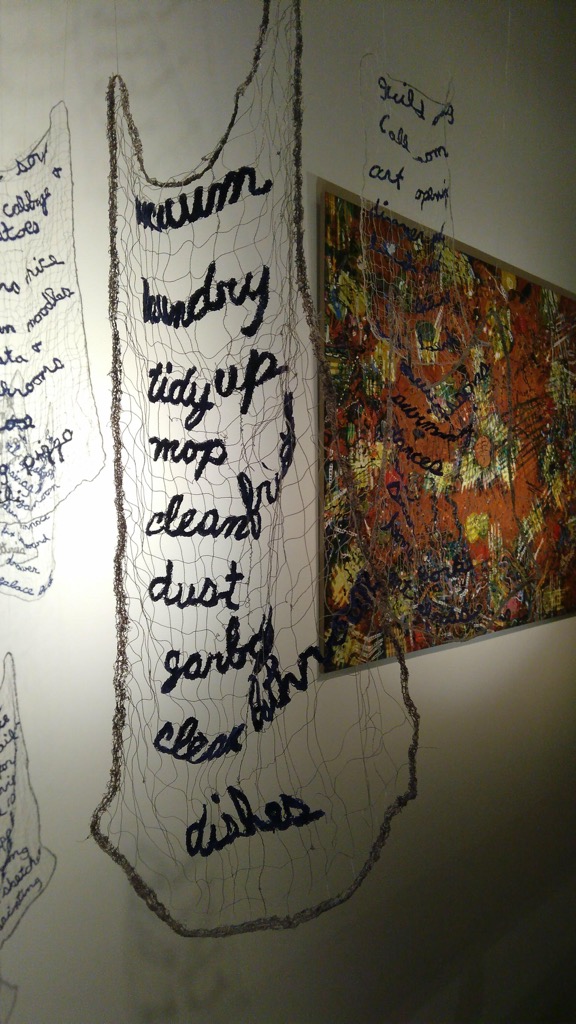
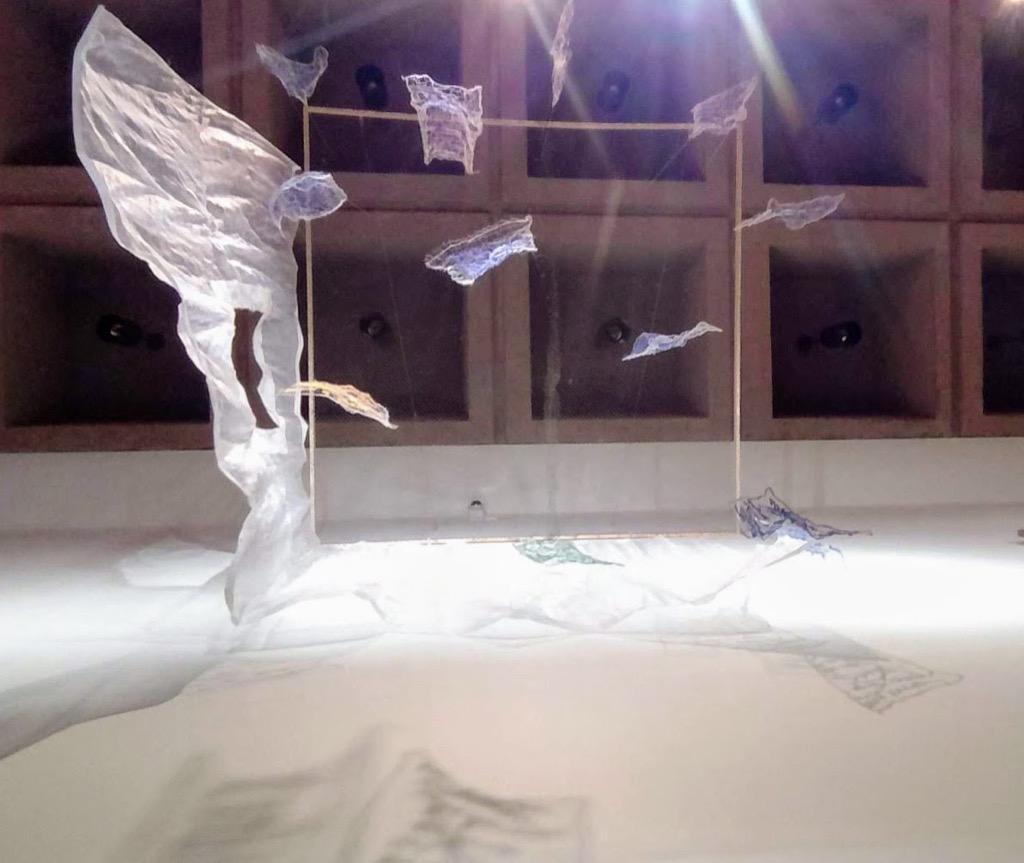
About 20 years ago I developed a taste for around-the-world travelogues; the first was Who Needs a Road? and I continued through Half-Safe, First Overland, Away from My Desk, Offbeat in Asia, In the Circle of the Sun, and innumerable others.
Something that almost every around-the-world tale shares is a gradual fade from incredible detail in the early pages to facile overview as the journey wanes. As the trips start we might see each day receive a page or two, with the details of every meal and every village related; it’s not uncommon, toward the end, to breeze through a week or two per page – “…and after that we passed through Albania…” Before you know it, the trip is over, regular life resumes, and unless there’s an epilogue, we’re left wondering what happened next. Which would be the most interesting part: it’s easy to cross Siberia on a motorbike compared to what I imagine is the difficult transition from river-fording to resumption of a desk job.
Of late my attention has turned from reading about long voyages to reading cancer memoirs; related genres, in a way. And my underlying motivation, to try to shine light on the vast expanses of the unknown, is similar.
I’ve just finished reading Nina Riggs’ The Bright Hour; before that Paul Kalanithi’s When Breath Becomes Air, Teva Harrison’s In-Between Days, and, many years ago, my friend Laurie Kingston’s Not Done Yet.
The gutting thing about reading cancer memoirs is that the hero always dies at the end. You know this going in, and the note about the author on the dust jacket inevitably reads “lived in Austin” rather than “lives in Austin.” As with around the world books, the minute-by-minute detail of diagnosis and early treatment slowly gives way, as months pass in the blink of a chapter. And then, tragically but necessarily, there is no detail of the final weeks and months, and the epilogue–there is always an epilogue–inevitably reads “…wrote those last words 2 months before she died.”
If, like me, you are reading a cancer memoir as a travelogue, a travelogue for the sort of journey that you happen to be accompanying someone you love on, then this sudden fade to black is confounding in the same way as not hearing how the trip through Albania went.
I have no idea what lies in Albania. And it’s hard to talk about what Albania is like because there is a sneaking, if irrational, suspicion that talking of Albania gets you to Albania sooner than you want to be there. Albania is terrifying both because it’s the end of the voyage and because so little is written about it. And what comes after Albania?
I have the gift of having two friends who, alas, have seen their wives die of metastatic breast cancer in the last year, and they have both been generous with relating their experiences and their wisdom. But even they cannot do justice to the terrain that lies ahead, as they are already on the other side of Albania, in a faraway place that I know I’ll end up but cannot yet comprehend.
From Ian Petrie, delivering the McRobie Lecture (as syndicated by Citizens Alliance News):
The thing about relationships… and this gets us back to Schumacher… is that people who care for each other’s welfare will treat each other fairly… maybe one year the buyer says I need a favour… can you drop the price to keep my boss happy.. The next year the farmers says I need a few more cents…. but when the relationship is linked purely by a number… purely by this is the price take it or leave it… and these big wholesalers and retailers can do this… then the partner in the relationship with less power loses…. and right now that’s always the farmer… right now food retailing is like the Game of Thrones.. And farmers are the disposable armies that go about slaughtering each other…
I benefit from a number of relationships that would meet Ian’s (Schumacher’s) standard for “small is beautiful,” and it makes me happy every time we transact. Sometimes my mechanic Dave says “you can get me the next time” when the repair is minor and it doesn’t make sense to write up a bill. Sometimes I buy a package of 11 eggs from Paul when the chickens refuse to lay in multiples of a dozen. My coffee at the Farmer’s Market was on the house today to recognize Oliver’s fantastic Halloween costume (I got the better end of that deal!). I recommended to Oliver’s art teacher that we up her rate to $40 from $35 as a way of solving the problem of making change every week. When I have a problem with my credit union account, I email Connie and she sorts it out for me.
Economic relationships like this, where “people who care for each other’s welfare will treat each other fairly,” are as different from how one buys a coffee at Starbucks as to exist in a different relationship universe; we should all strive to move 100% of our transacting in this direction.
Ian Petrie is one of the wisest people I know; when he holds forth like this, we’re all better for the listening.
Catherine has a piece in the show that’s opening tomorrow night at the Confederation Centre Art Gallery. As it’s a complicated, delicate piece that’s to be mounted high in the air, its installation has spread over three days. Fortunately the gallery has a crack curatorial team, and it’s all coming together.
Here’s a sneak peek; come to the gallery tomorrow night for the opening to see it in all its splendour.
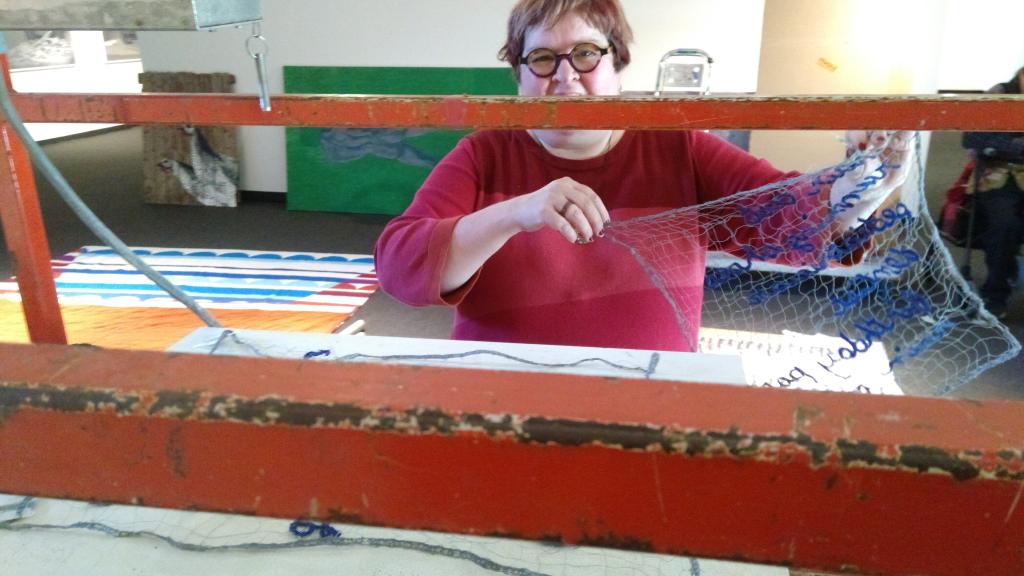 ,
, 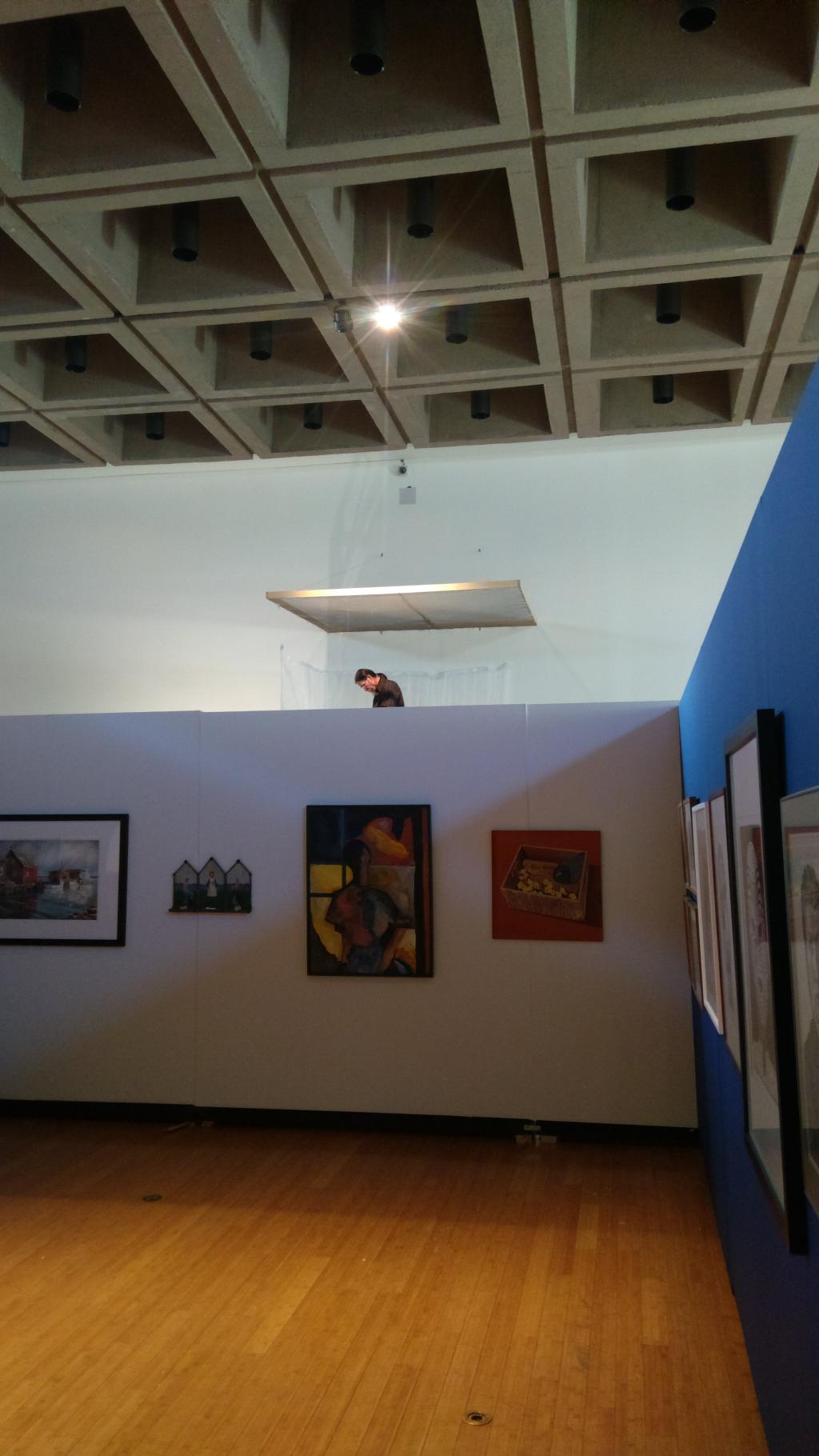 ,
, 
Frank chimes in with his own thoughts on bookmarks practice and includes a description of his blogging that comes as close to my own as I’ve come across:
My blog has always been this wunderkammer, a cabinet of curiosities where the categorical boundaries are yet to be defined. Of course you can see some of the topics that are of interest, but I feel my blog should be some short of Frankopedia, where you get to know more about me, not just as a professional but also as a person. So I love to share links and pointers to all sorts of places on the web. Sometimes with some context, sometimes just a link.
Frank helpfully wrote this post in English:
BTW, if you’re wondering why I am writing in English, it’s my service to Peter to save him another trip to the machine-translator and get an idea what I am talking about ;-)
I appreciate this: Frank Translate is way better than Google Translate.
I’ve long been fascinated with the minutiae of daily life, and I’d love to read posts similar to those we’ve written today about bookmarks but about toothbrushing, car oil changes and breakfast food habits.
Bill McFadden has heretofore been notable to me primarily for his ubiquity: he is one of a small cast of people whose path I seem to cross several times a day while making my way around downtown Charlottetown. When Fred Rogers sang of “the people in my neighbourhood,” it was people like Bill he had in mind.
In addition to his ubiquity, Bill is also an actor (“an actor of extraordinary gift and remarkable talent,” wrote my friend Ann some years ago), a writer, a father, and someone who has thought a lot about the world and how it works and doesn’t.
A few weeks ago I ran into Bill on Prince Street and his impending entry into municipal politics was much in evidence: he had the nomination package in hand, and was in the midst of dotting and crossing.
So it was not a surprise when, a few days later, he became the fifth person to announce a candidacy for Mayor of Charlottetown in November 5th’s municipal election.
My first chance to see Candidate McFadden in action was at Wednesday’s Mayoral Debate; it turns out that Candidate McFadden is pretty much like regular-everyday-person McFadden: thoughtful, entertaining, and a good listener.
Bill’s time on the dais on Wednesday was mostly spent in observational silence; he did, however, make two powerful points.
First was that the role of mayor is to chair meetings of council, to develop consensus, to cast the deciding vote when needed, and to report the results to the people.
The truth of this is born out in the Municipal Government Act:
Role and duties of mayor
The mayor of a municipality, in addition to performing the duties of a member of council, has a duty to
(a) preside, when in attendance, at all council meetings, except where this Act provides otherwise;
(b) provide leadership to the council and the chief administrative officer;
(c) cast a deciding vote in instances where there is an equal number of votes for and against a bylaw or resolution; and
(d) perform any other duty or function imposed on the mayor by a bylaw or this Act.
While “performing the duties of a member of council,” can, of course, include having ideas of ones own, it seems clear that the primary duty of the mayor is to act as combination Chief Facilitator and Chief Storyteller.
None of the other candidates embraced this characterization to the extent that Bill did: each presented an agenda of projects, ranging from eliminating traffic accidents to building new ice rinks to filling in ditches. While there was lip-service paid to consensus-building and public consultation, the notion that the mayor’s chief goal should not be to reshape the city in their own image but rather to do everything they can to enliven the necessarily collaborative process of council hovered far off in the background. If it was there at all.
When I was chair of PEI Home and School Federation, I would often get calls from the media on various public school-related issues: “what do parents think of the new zombie apocalypse drill procedures?”, “should students be held back to repeat a grade,” “how do you feel about the standardized test results?”
My universal reply was “I don’t know.” Unless it happened to be an issue on which our federation had reached consensus through a policy resolution. I did not consider it my role to have opinions, to have an agenda, to communicate my personal take on education as though it represented the collective view (indeed my personal take was often at odds with the collective view). Instead, I saw my role as doing what I could to bring people together, to help them make decisions, and to communicate those decisions to others.
That model of leadership has served Home and School well for 65 years, and I believe it’s the model that should govern the conduct of the mayor; of the candidates, only Bill McFadden appears to agree with me on this.
The second point that Bill made is that there’s no “us and them, there is only us.” He put this emphatically and eloquently, in a way that I cannot properly do justice without a transcript, but I appreciated both his message and his ability to communicate it. While I’m not looking for a mayor with a policy position on traffic lights, I am looking for a mayor with a policy position on humanity, and humanity seems to be something that Bill McFadden has a lot of.
There are five good people running for Mayor of Charlottetown this fall. Four of them have spent months of work on their campaigns, have teams of supporters, campaign offices, brochures, and answers for any question that electors might put to them; it is clear that each of the four is very invested in the campaign, and wants to be mayor.
Bill McFadden seems to, mostly, want to continue to be Bill McFadden. It seems odd to say so, but I think that having a mayor who casually ambles to the position out of a sense of civic duty is preferable to someone who wants to be mayor so badly they can taste it.
At the end of Wednesday’s debate we spotted Bill’s bicycle near the entrance of the hall, and we hung around, groupie-like, to thank him for his approach. We had a brief chat, and then he got on his bike and sped off into the cool Charlottetown night.
Bill McFadden, I think, deserves our serious consideration for the job.
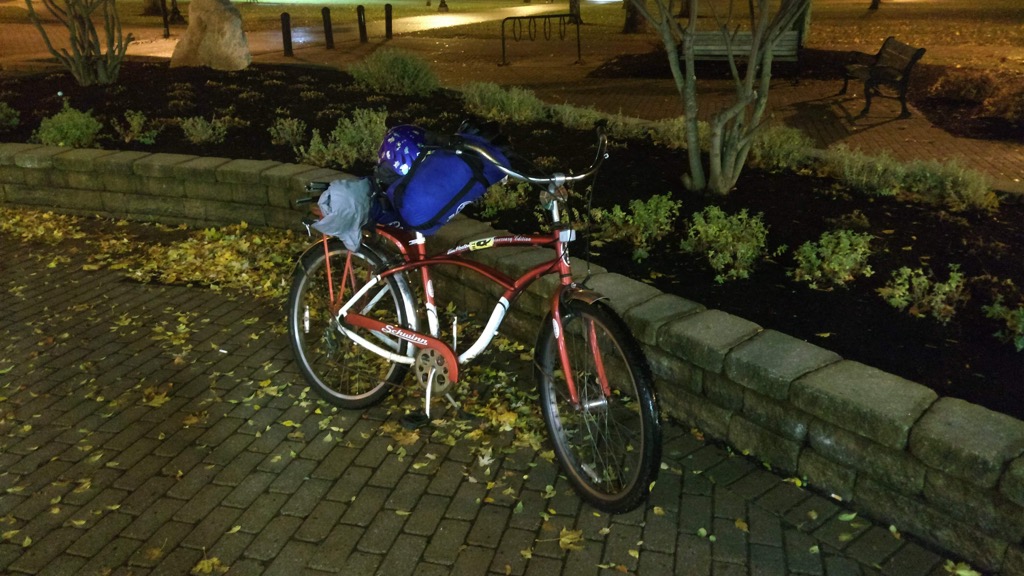
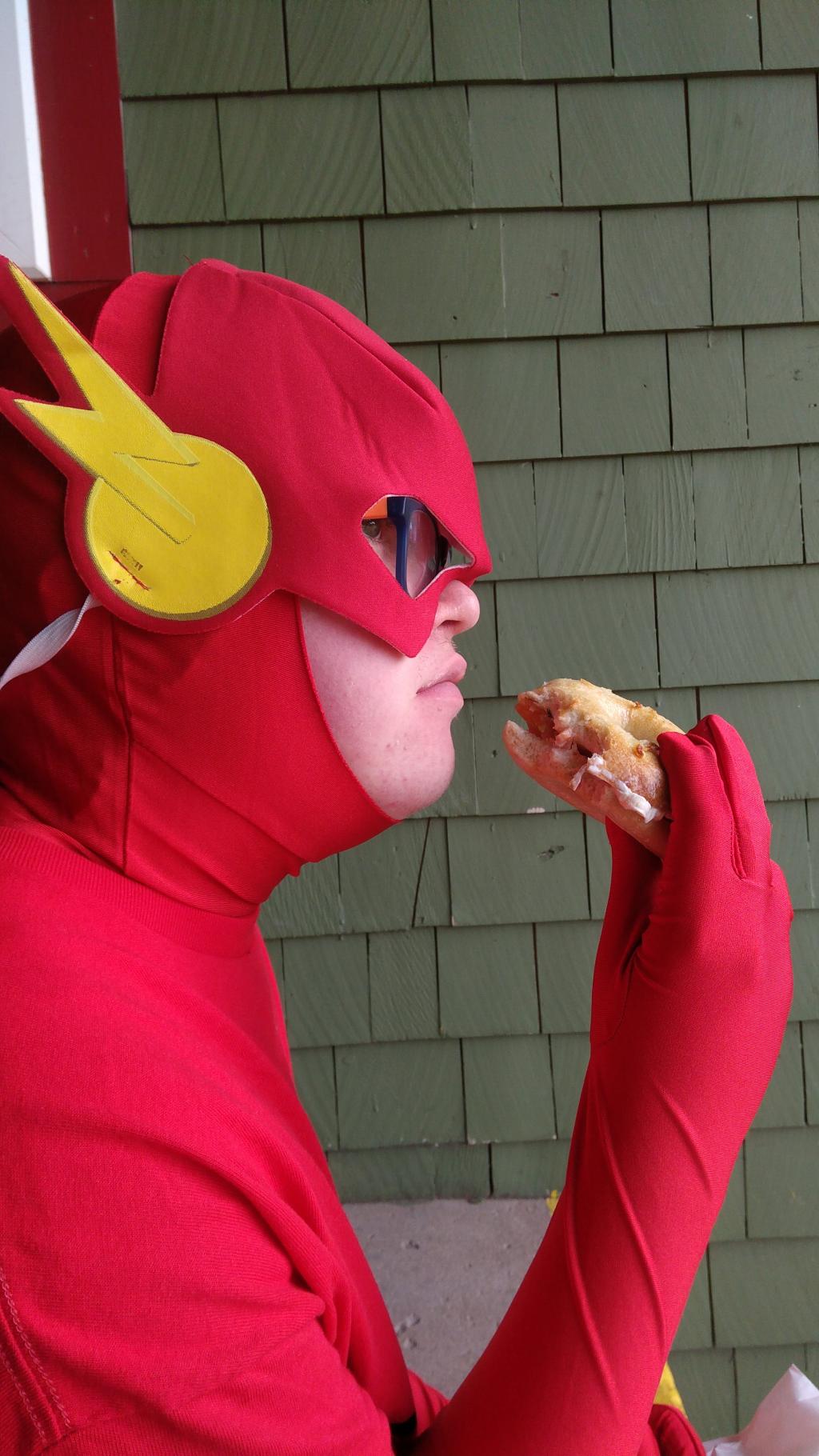
 I am
I am